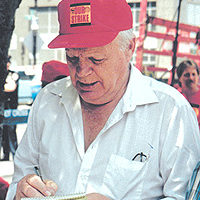The threat by President George Bush to intervene in contract talks between the International Longshore and Warehouse Union (ILWU) is a classic example of how U.S. laws governing labor management relations are tilted against workers and their unions and but another example of Bush’s hatred of working people.
Although the struggle of the U.S. working class to win the right to organize unions and to engage in collective bargaining has always been difficult, seldom has the labor movement been under such sharp attack as it is today. Be it negotiations between flight attendants and American Airlines or mechanics at Northwest Airlines, the White House has shot first and asked questions later when it comes to prohibiting strikes. That record is compounded by the threat to use federal troops in an effort to help the Pacific Maritime Association destroy the ILWU as an effective representative of West Coast “wharfies.”
After years of hard-fought struggles workers eventually won legal protection of the right to organize unions. The Clayton Act of 1914 said the anti-trust laws of that era could not be “construed to forbid the existence and operation of labor … organizations,” adding that labor organizations could not be “construed to be illegal combinations or conspiracies in restraint of trade.”
But it wasn’t until the upsurge of the 1930s that workers were able to win the protections of the Norris-LaGuardia Act (1932), which gave affirmative sanction to the right of labor unions to organize and strike.
The law barred federal courts from issuing restraining orders or injunctions against activities by labor unions and individuals for organizing a union, striking or advising others to strike or organize.
Other gains won by the struggles that gave rise to the powerful unions of the CIO included the National Labor Relations Act (NLRA), popularly called the “Wagner Act” after its author, New York Senator Robert Wagner. That federal legislation guaranteed workers in private industry the right to organize and join labor movements, to choose representatives, bargain collectively and strike.
While prohibiting employers from engaging in unfair labor practices such as interfering with formation of a labor union, interfering with or refusing to bargain collectively with unions representing a company’s employees, the NLRA had no provisions defining as unfair any practices by unions. The legislation served to spur the growth of unions from 3,584,000 members in 1935 to 10,201,000 by the beginning of World War II.
Other New Deal legislation made it a felony to transport any person in interstate commerce for the purpose of strike-breaking; provided for “prevailing wages;” restricted regular working hours to eight hours a day and 40 hours a week; prohibited the employment of convicts, and children under 18; and established sanitation and safety standards.
The tables were turned in 1947 when the 81st Congress, controlled by Republicans for the first time since 1930, overruled President Truman’s veto and rammed the Taft-Hartley Law through Congress. (An ailing Senator Wagner was carried into the Senate chamber on a stretcher to cast his vote.)
Although the legislation rewrote many of the provisions of the Wagner Act, its most damaging provisions were those giving the Department of` Labor the power to seek an injunction ending or preventing strikes that “imperil the national health.” In the years since its passage, injunctions have been granted in 38 instances, the last time in 1978.
While ostensibly retaining the Wagner Act’s guarantee of workers’ rights, the Taft-Hartley amendments gutted the Norris-LaGuardia Act by permitting injunctions against strikes. It undermined the right of workers to select representatives of their own choosing by requiring union officers to sign the infamous non-communist affidavits.
Despite the best efforts of organized labor, the Taft-Hartley Act still stands essentially as written in 1947. There has been no serious effort at revision since 1977, when Senate proponents of labor law reform could not muster the 60 votes necessary to bring amendments to the floor.
The recent meeting of the AFL-CIO Executive Council decided to renew the campaign and assigned a full- time staff member to that challenge.
The author can be reached at fgab708@aol.com

MOST POPULAR TODAY

High Court essentially bans demonstrations, freedom of assembly in Deep South

Zionist organizations leading campaign to stop ceasefire resolutions in D.C. area

U.S. imperialism’s ‘ironclad’ support for Israel increases fascist danger at home


UN warns that Israel is still blocking humanitarian aid to Gaza



Comments